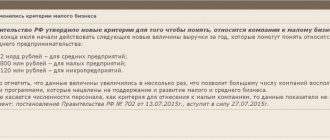Hello, dear colleague! Today's article will focus on socially oriented non-profit organizations. We will talk in detail about which organizations belong to SONPOs, how they are supported by the state, and also consider the features of the participation of such organizations in procurement within the framework of 44-FZ. The article will be useful primarily to procurement participants who belong to these organizations.
SONKO transcript
SONKO stands for socially oriented non-profit organization.
According to Part. 2.1-3 Article 2 of the Federal Law of January 12, 1996 No. 7-FZ “On Non-Profit Organizations”, socially oriented non-profit organizations are non-profit organizations created in the forms provided for by the law “On Non-Profit Organizations”, namely: public or religious organizations (associations), communities of indigenous peoples of the Russian Federation, Cossack societies, foundations, non-profit partnerships, institutions, autonomous non-profit organizations, associations of legal entities (associations and unions), with the exception of state corporations, state companies, public associations that are political parties.
Socially oriented non-profit organizations carry out activities aimed at solving social problems, developing civil society in the Russian Federation, as well as the types of activities provided for in Art. 31.1. Law “On Non-Profit Organizations”:
1) social services, social support and protection of citizens;
2) preparing the population to overcome the consequences of natural disasters, environmental, man-made or other disasters, to prevent accidents;
3) providing assistance to victims of natural disasters, environmental, man-made or other disasters, social, national, religious conflicts, refugees and internally displaced persons;
4) environmental protection and animal protection;
5) protection and, in accordance with established requirements, maintenance of objects (including buildings, structures) and territories of historical, religious, cultural or environmental significance, and burial sites;
6) provision of legal assistance on a free or preferential basis to citizens and non-profit organizations and legal education of the population, activities to protect human and civil rights and freedoms;
7) prevention of socially dangerous forms of behavior of citizens;
 charitable activities, as well as activities in the field of promoting charity and volunteering;
charitable activities, as well as activities in the field of promoting charity and volunteering;
9) activities in the field of education, enlightenment, science, culture, art, healthcare, prevention and protection of the health of citizens, promotion of a healthy lifestyle, improvement of the moral and psychological state of citizens, physical culture and sports and promotion of these activities, as well as promotion of the spiritual development of the individual ;
10) formation in society of intolerance towards corrupt behavior;
11) development of interethnic cooperation, preservation and protection of the identity, culture, languages and traditions of the peoples of the Russian Federation;
12) activities in the field of patriotic, including military-patriotic, education of citizens of the Russian Federation;
13) carrying out search work aimed at identifying unknown military graves and unburied remains of defenders of the Fatherland, establishing the names of those killed and missing in action while defending the Fatherland;
14) participation in the prevention and (or) extinguishing of fires and carrying out emergency rescue operations;
15) social and cultural adaptation and integration of migrants;
16) measures for medical rehabilitation and social rehabilitation, social and labor reintegration of persons engaged in illegal consumption of narcotic drugs or psychotropic substances;
17) promoting increased mobility of labor resources;
18) perpetuating the memory of victims of political repression.
Support for socially oriented non-profit organizations
According to Part 3 of Art. 31.1 7-FZ, support for socially oriented non-profit organizations is provided in the following forms:
1) financial, property, information, consulting support, as well as support in the field of training, additional professional education of employees and volunteers of socially oriented non-profit organizations;
2) providing socially oriented non-profit organizations with benefits for paying taxes and fees in accordance with the legislation on taxes and fees;
3) procurement of goods, works, services to meet state and municipal needs from socially oriented non-profit organizations in the manner established by the legislation of the Russian Federation on the contract system in the field of procurement of goods, works, services to meet state and municipal needs;
4) providing legal entities that provide material support to socially oriented non-profit organizations with benefits for paying taxes and fees in accordance with the legislation on taxes and fees.
Subjects of the Russian Federation and municipalities, along with the forms of support established above, have the right to provide support to SONPOs in other forms through budgetary allocations from the budgets of constituent entities of the Russian Federation and local budgets, respectively.
Providing financial support to SONPOs can be carried out in accordance with the legislation of the Russian Federation through budgetary allocations from the federal budget, budgets of constituent entities of the Russian Federation, local budgets through the provision of subsidies. Federal budget allocations for financial support of SONCOs (including for maintaining a register of socially oriented organizations receiving support), including subsidies to the budgets of constituent entities of the Russian Federation, are provided in the manner established by the Government of the Russian Federation.
Also, the provision of property support to SONPOs is carried out by state authorities and local governments by transferring state or municipal property into the possession and (or) use of such non-profit organizations. The specified property must be used only for its intended purpose.
Administrative responsibility
Administrative liability for non-compliance with legislation on placing an order with SMP
defined:
- violation of the deadlines for posting information in the unified procurement information system during a competition or auction for less than two days
is subject to
a fine of 5 and 15 thousand rubles
for individuals and legal entities, respectively; - if the specified period is violated by more than two days,
the fine is
30 and 100 thousand rubles
; - violation of the deadline for posting information when requesting quotes or proposals from small businesses for no more than a day - 3 and 10 thousand
for individuals and legal entities; - similar violation with a delay of more than a day - 15 and 50 thousand
; - Violation of the requirements and procedure for posting information
on purchases from small businesses entails
a fine of 15 and 50 thousand
.
Penalties are also imposed for other administrative violations - unlawful refusal, failure to comply with protocol and reporting requirements. Separately, it is necessary to point out the fine for failure to fulfill the established volume of purchases
for small businesses - it is
50 thousand rubles
.
Small businesses, socially oriented non-profit organizations in the amount of no less than fifteen percent of the total annual volume of purchases, calculated taking into account part 1.1 of this article, by:
1) holding open tenders, tenders with limited participation, two-stage tenders, electronic auctions, requests for quotations, requests for proposals, in which procurement participants are only small businesses and socially oriented non-profit organizations. In this case, the initial (maximum) contract price should not exceed twenty million rubles;
1.1. When determining the volume of purchases provided for in Part 1 of this article, the following purchases are not included in the calculation of the total annual volume of purchases:
1) to ensure the defense of the country and the security of the state;
2) services for providing loans;
3) from a single supplier (contractor, performer) in accordance with Part 1 of Article 93 of this Federal Law, with the exception of purchases that were made in accordance with clauses 25 - 25.3 of Part 1 of Article 93 of Clause 1 of Part 1 of this article;
(see text in the previous edition)
4) work in the field of atomic energy use;
5) in the implementation of which closed methods of identifying suppliers (contractors, performers) are used.
1.2. Customers have the right to make purchases specified in paragraphs 1 and 5 of part 1.1 of this article from small businesses and socially oriented non-profit organizations in accordance with part 1 of this article. In this case, the volume of such purchases is taken into account in the volume of purchases made by customers from small businesses and socially oriented non-profit organizations in accordance with Part 1 of this article, and is included in the report specified in Part 4 of this article.
2. This article applies to socially oriented non-profit organizations (with the exception of socially oriented non-profit organizations whose founders are the Russian Federation, constituent entities of the Russian Federation or municipalities) carrying out, in accordance with the constituent documents, the types of activities provided for in paragraph 1 of Article 31.1 of the Federal Law dated January 12, 1996 N 7-FZ “On Non-Profit Organizations”.
3. When identifying suppliers (contractors, performers) by the methods specified in paragraph 1 of part 1 of this article, procurement notices establish a restriction in relation to procurement participants, which can only be small businesses and socially oriented non-profit organizations. In this case, procurement participants are required to declare in applications for participation in procurement that they belong to small businesses or socially oriented non-profit organizations.
(see text in the previous edition)
4. If the determination of suppliers (contractors, performers) is declared invalid due to the fact that at the end of the deadline for submitting applications, final proposals, not a single application, not a single final proposal, or all applications, final proposals were rejected in the manner established by this Federal Law, the customer has the right to cancel the restriction specified in Part 3 of this article and make purchases on a general basis. Moreover, such purchases made on a general basis are not taken into account in the volume of purchases made by customers from small businesses and socially oriented non-profit organizations in accordance with Part 1 of this article. Purchases that were made on the basis of clauses 25 - 25.3 of part 1 of article 93 of this Federal Law based on the results of a failed identification of suppliers (contractors, performers) carried out in accordance with the requirements of clause 1 of part 1 of this article are taken into account in the volume of purchases that customers made from entities small businesses, socially oriented non-profit organizations. At the end of the year, the customer is obliged to draw up a report on the volume of purchases from small businesses, socially oriented non-profit organizations provided for in Part 2 of this article, and by April 1 of the year following the reporting year, place such a report in a unified information system. In such a report, the customer includes information about concluded contracts with small businesses and socially oriented non-profit organizations.
(see text in the previous edition)
5. When identifying a supplier (contractor, performer), the customer has the right to establish in the notice of procurement a requirement for the supplier (contractor, performer), who is not a small business entity or a socially oriented non-profit organization, to involve subcontractors, co-executors from among small businesses in the execution of the contract entrepreneurship, socially oriented non-profit organizations.
(see text in the previous edition)
6. Conditions on the involvement of subcontractors, co-executors from among small businesses, socially oriented non-profit organizations in the execution of contracts in the case provided for
Small businesses in Russia enjoy special benefits intended only for them. The state is trying to reduce the tax and administrative burden of small businesses, receiving in return an increase in employment and a decrease in social tension. What does the definition of “small businesses” mean and who belongs to them in 2021?
A small business entity is a Russian commercial organization or individual entrepreneur that aims to make a profit. Also included in this category are:
- peasant (farm) farms;
- production and agricultural cooperatives;
- business partnerships.
A non-profit organization, as well as a unitary municipal or state institution is not a small business entity.
Register of socially oriented non-profit organizations
According to Art. 31.2 7-FZ “On Non-Profit Organizations” federal executive authorities, executive authorities of constituent entities of the Russian Federation and local administrations providing support to SONPOs form and maintain federal , state and municipal registers of socially oriented non-profit organizations - recipients of such support.
The register of SONCO recipients of support includes the following information about the non-profit organization:
1) full and (if available) abbreviated name, address (location) of the permanent body of the non-profit organization, state registration number of the record of state registration of the non-profit organization (main state registration number);
2) taxpayer identification number;
3) the form and amount of support provided;
4) duration of support;
5) name of the state authority or local government body that provided support;
6) the date of the decision to provide support or the decision to terminate the provision of support;
7) information about the types of activities carried out by the SONCO that received support;
 information (if available) about violations committed by the SONCO that received support, including misuse of provided funds and property.
information (if available) about violations committed by the SONCO that received support, including misuse of provided funds and property.
The procedure for maintaining registers and storing documents submitted by SONCO, requirements for technological, software, linguistic, legal and organizational means of ensuring the use of these registers are established by the authorized federal executive body.
The information contained in the SONPO registers is open to the public.
So, for example, you can find the register of SONCOs in Moscow here, and the register of St. Petersburg here.
SONCO Register
If we turn to Art. 31.2 of the Federal Law “On Non-Profit Associations”, we will see that the executive authorities of the Russian Federation are required to maintain federal, local and regional registers of persons providing support to SONCO.
The following information is entered into the document:
- Names (full and abbreviated), legal address of SONKO.
- Activities of the association.
- Registration number of the registry item.
- TIN.
- Size and type of support.
- Timing of assistance.
- Name of the body that provided support.
- Making a decision to start/stop assistance.
- Information about violations. For example, material support was spent on non-targeted activities.
All information from this register is open and freely available. Anyone can get acquainted with it.





